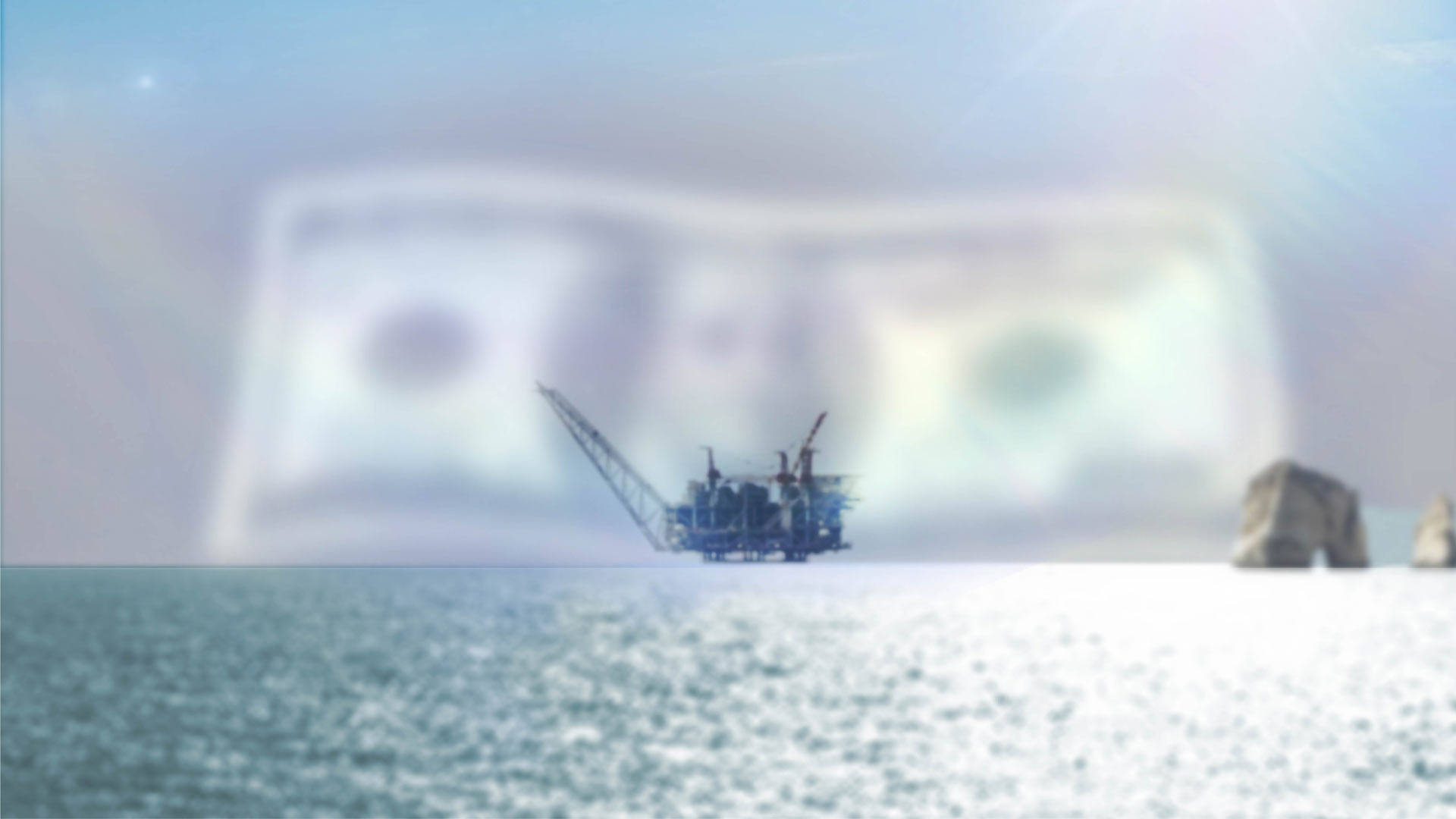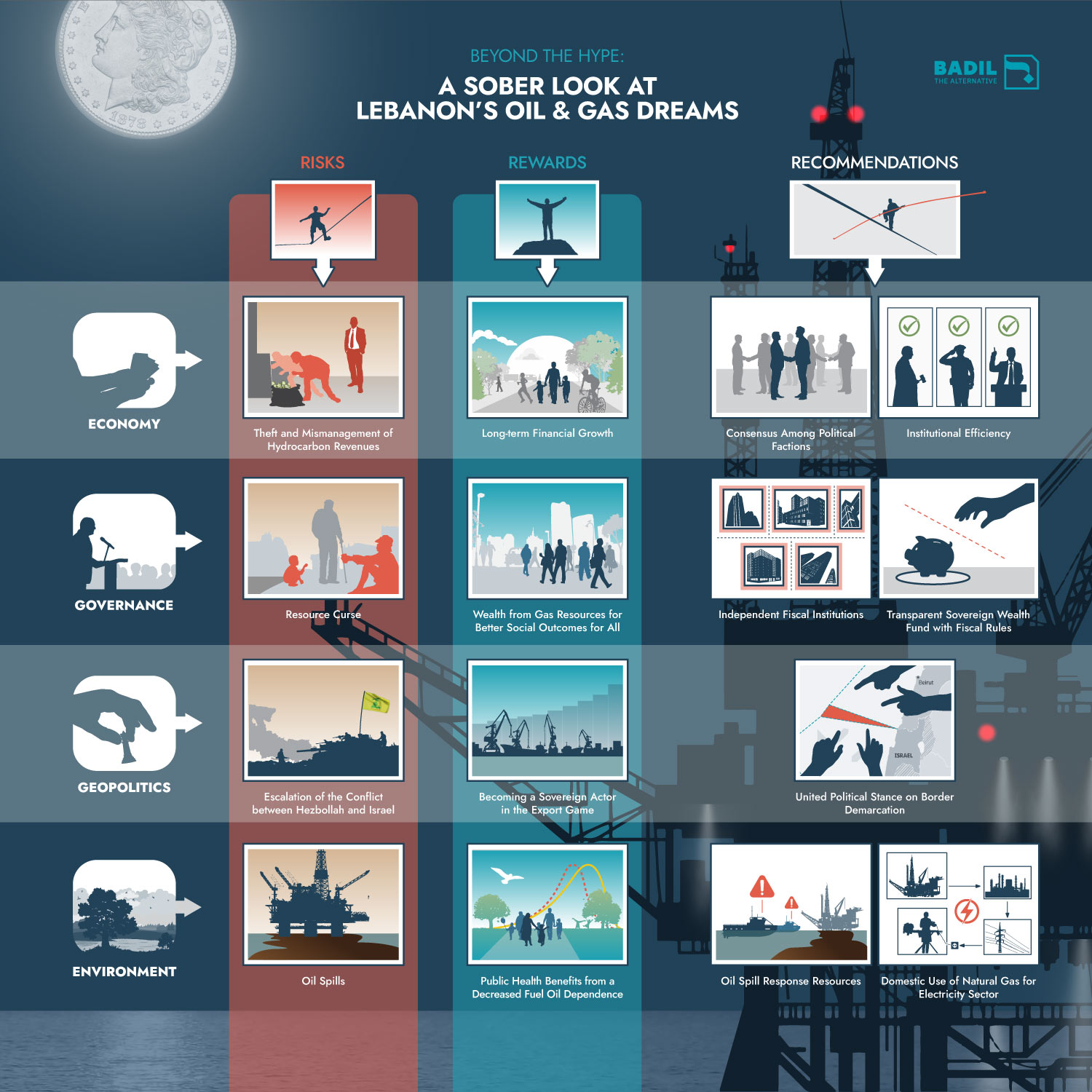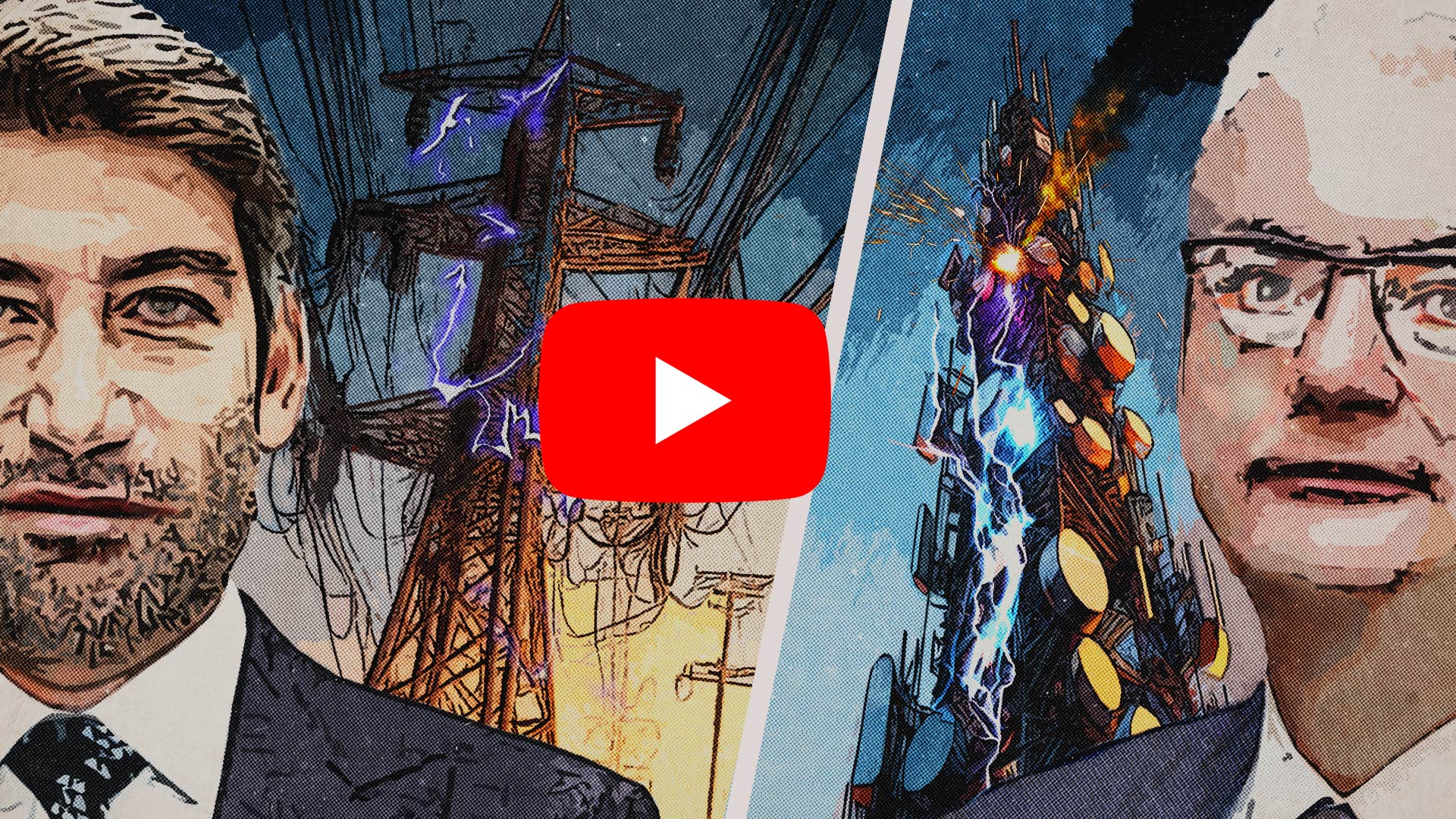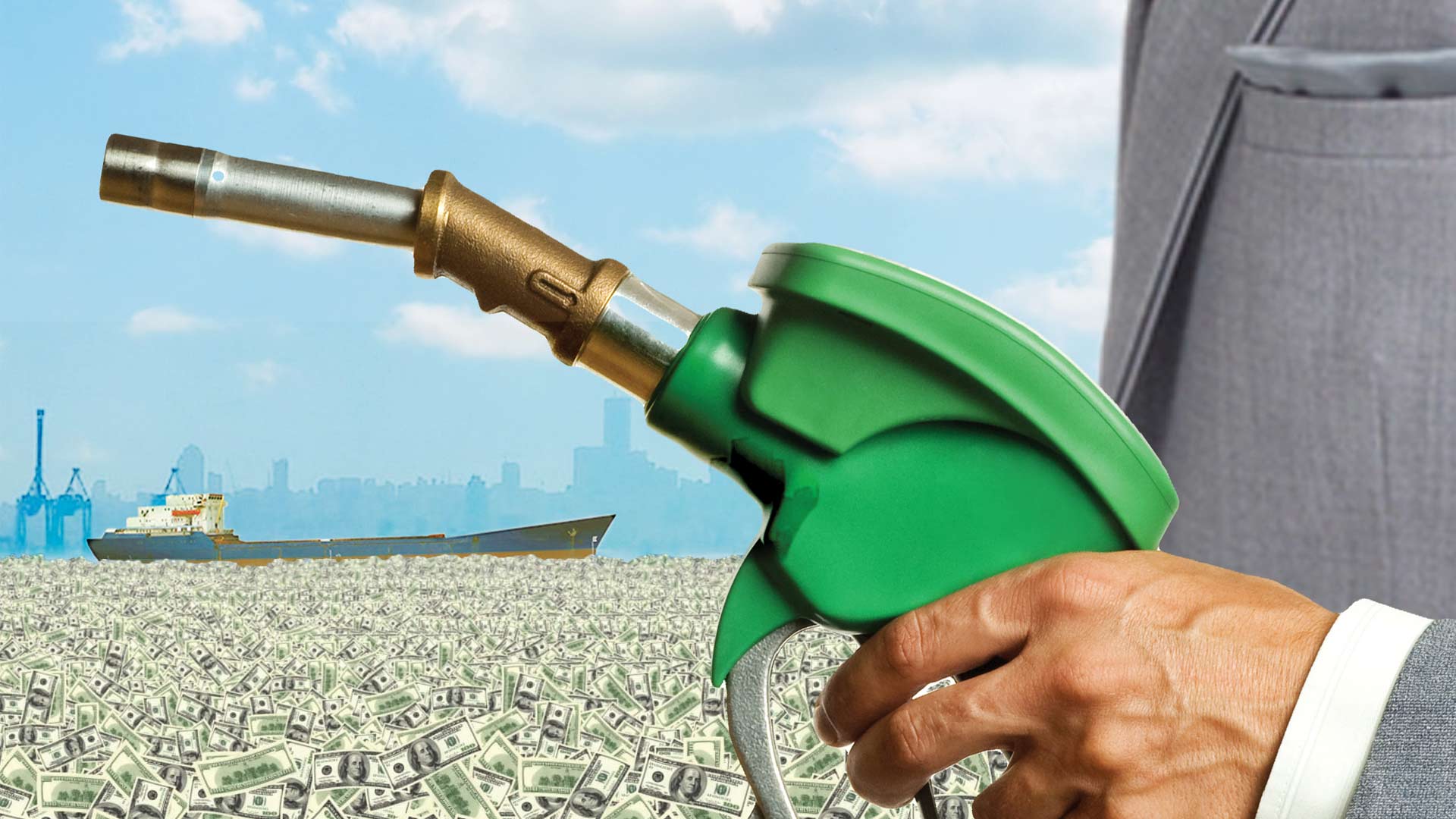Time is Money
The increased demand for natural gas, especially in Britain and the European Union (EU), has seen global prices skyrocket, making oil and gas winnings in Lebanon commercially feasible, even if only small reserves are found. But unlike Israel, which quickly responded to the changing market conditions, Lebanon’s sluggish state institutions have only weakened the country’s negotiating position and deterred companies from investing.
In what was only Lebanon’s second-ever licensing round, the Ministry of Energy and Water (MoEW) was forced to extend the deadline for energy firms to submit their bids for eight of the 10 offshore blocks no less than four times, while reducing the requirements for companies to place a bid. Only two weeks before the deadline, MoEW slashed the bidding application fee from US $50,000 to US $5,000.[3]
Several experts interviewed by Badil said the extensions and amendments signalled a general lack of interest among international companies to invest in Lebanon. In addition, theongoing border demarcation issue, the Covid-19 pandemic, and the Beirut port explosion have all played a role in stalling the process of awarding exploration and production agreements.
Lebanon’s first bidding round took place in 2013, after which it took the government until December 2017 to approve the sole bid from an international consortium including France’s Total, Italy’s Eni and Russia’s Novatek. Contracts were signed in early 2018 and oblige the group to drill two wells in Block 4 and Block 9 respectively.
To date, only one well has been drilled – in Block 4. And while there were prospects of gas reserves, they were not sufficient for the companies to reach a final investment decision. The problem with Block 9 is that part of it lies in waters disputed by Israel. From the start, Total has said it would not drill near the disputed zone.
According to Diana Kaissy, an advisory board member at the Lebanese Oil and Gas Initiative (LOGI), an independent organization informing and promoting transparency in the energy sector, the Lebanese Petroleum Association (LPA) has extended the deadline for the Total-led consortium to complete drilling by 2.7 years to August 13, 2022, thus adding yet another layer of delay to the ongoing hydrocarbon saga.
Established in 2012, the LPA is an autonomous public body mandated to plan, supervise, and manage the upstream petroleum sector in Lebanon. Of the eight remaining offshore blocks, six are situated in disputed maritime zones with either Israel, Cyprus, or Syria. Lebanon’s seemingly endless demarcation issues, especially with its southern neighbour Israel, is a significant risk factor deterring international companies from investing, or even bidding. But that is hardly the only issue standing in Lebanon’s way.
Before companies embark on the lengthy and costly procedure of becoming a rightsholder to Lebanon’s offshore blocks, they need assurances that a functioning government is in place and that state institutions are able to help facilitate the exploration and exploitation process.
Wishful Thinking
On June 3, Fadi Khalaf, Secretary-General of the Association of Banks in Lebanon (ABL), released a statement calling for the transfer of 20% of any future oil and gas revenues to a special fund to repay depositors duped by the banking crisis. Khalaf claimed that the company Spectrum, which conducted 2D and 3D seismic surveys of the Lebanese coast, found evidence of “25 to 96 trillion cubic feet (TcF)” of natural gas resources. [4]
But Khalaf needs to do his homework. Spectrum in fact reported that Lebanon’s seabed may only hold 12 to 25 TcF of recoverable gas. Regardless of the exact quantities, cashing in on unproven reserves, which is what Lebanon’s political and financial elite continuously call for, is a dangerous game of counting chickens before they hatch.
While there is some evidence of offshore hydrocarbon reserves, so far no commercially viable quantities have been found. And the ocean floor will hold secret to its riches, until oil and gas companies continue exploring and, perhaps, one day exploiting Lebanese waters.
The dry well in Block 4 does not help Lebanon’s case for attracting oil and gas investors. Drilled at a depth of 4,076 meter through 1500 meters of water the well observed traces of gas, confirming the presence of a hydrocarbon system, but no major reservoirs were encountered. It is estimated that in “frontier countries” like Lebanon, which have no proven reserves, wells only have a 20% success rate of finding commercially viable quantities of hydrocarbons. [5]
But even if commercial quantities were to be discovered, revenues would realistically not reach Lebanon’s coffers until 2030, at best. [6] If Lebanon were able to sell these resources in the next decade – a big if – the proceeds would not be a magic wand suddenly transforming Lebanon’s economy, creating thousands of jobs, and wiping out the country’s massive national debt.[7]
“Fixing Lebanon’s debt does not start by feeding it more revenues from a finite resource. It would be like pouring water into a basket,” Kaissy told Badil, explaining that hydrocarbon revenues cannot be a pillar of the nation’s economic recovery plan. Not only are the estimated quantities too scarce to rely on, but they would fail to address the root causes of Lebanon’s financial and economic woes.
On a more optimistic note, gas resources could be used to meet Lebanon’s electricity needs. Currently, the country’s power plants mainly rely on the use of expensive, and dirty, gasoil and fuel oil, the import of which since 1992 accounts for some 40% of the current sovereign debt. [8]
Lebanon’s plants could be converted to gas-fired power stations, which would greatly relieve the burden on the government deficit. Round-the-clock electricity would furthermore have a positive impact on the economy and be beneficial for the environment and public health.
Lebanon’s Offshore Petroleum Resource Law (OPRL) stipulates that potential windfalls from the hydrocarbon sector should be deposited in a sovereign wealth fund. If used wisely, these revenues could kick-start Lebanon’s economic recovery and initiate long-term growth. However, with great petroleum comes great responsibility.
Fragile institutions getting weaker
To properly manage an important and strategic file such as offshore hydrocarbons, Lebanon needs strong and competent state institutions. Yet, the financial crisis has only exacerbated existing weaknesses. Currently, the Lebanese state is struggling to provide even basic services.
The various institutions in charge of the oil and gas dossier can barely continue their day-to-day work due to a lack of resources. Head of the LPA Walid Nasr told Badil that the association now has four board members compared to six pre-crisis, and 13 service providers instead of 25.
Meanwhile, many questions remain unanswered. How can Lebanon’s institutions manage crucial assets, revenue streams, safety and environmental issues? How can the army protect offshore installations and resources when the average salary of its soldiers is barely US $50? How can the government attract qualified staff when so many Lebanese professionals are leaving the country due to the crisis?
Institutional weaknesses are well-known and longstanding. The maritime demarcation negotiations with Cyprus were a prime example. The two countries signed an agreement to delineate their shared borders in 2007, only for Lebanon to discover four years later it had made a major mistake. As revealed by the United Kingdom Hydrographic Office, the Lebanese delegation had handed over a significant part of Lebanon’s rights over a maritime area to Cyprus.[9]
Supposedly independent, the LPA sits under the MoEW and as such is stuck in the morass of Lebanese politics. Bickering, particularly between the Free Patriotic Movement and Amal, has continuously delayed the exploration process and poses severe threats to the sector’s sustainable management. In true Lebanese fashion, the LPA board has been divided along sectarian lines, with each political party trying to get the upper hand. Naturally, the party that manages to head the LPA has an advantage in setting the political agenda both domestically and regionally.
According to oil and gas policy expert Laury Haytayan, hydrocarbons should be the very last item for politicians to discuss due to the high risk of them mishandling the portfolio. “We have a list of priorities, and at the end, we can discuss the gas and support the economy of the country,” she told Badil.
Potentially valuable oil and gas reserves could aggravate existing tensions and put the country at risk of the so-called resource curse, she added. Also known as the “paradox of plenty,” the phenomenon refers to the failure of resource-rich countries to benefit fully from their natural resource wealth, and for governments of such countries to respond effectively to public welfare needs. [10] The reasons vary and include the volatility of primary resources, particularly fuel, as well as corruption within state institutions. Relying more on hydrocarbons as a sector is the epitome of a rentier economy that brought Lebanon to where it is, and by its nature destroys economic diversification and resilience. Some researchers also point to a correlation between natural resources and civil wars.[11]
However, if well-managed, Lebanon could reap huge rewards from its offshore resources. Norway is one of the few countries that has successfully used its oil and gas revenues to create a better social outcome for its people.
Revenues from Norway’s oil and gas reserves are transferred into a sovereign wealth fund managed by the Norwegian central bank. The purpose is to ensure complete transparency. At the end of each year, the fund’s annual report discloses a list of all investments made and provides an overview of corporate governance work. The voting records from general meetings are also diffused live.[12] The fund only invests abroad in order not to overheat the Norwegian economy.
On the back of its success, Norway through the Oil for Development Programme has been helping Lebanon since 2007 to create a similar framework for its gas sector. Mostly through capacity building, Norwegian experts are helping Lebanon to create an efficient and transparent legislative basis to prevent conflicts of interest and enhance transparency.
The next step will be establishing Lebanon’s own sovereign wealth fund to properly invest potential revenues and achieve solid long-term economic growth. But the three draft laws aiming to set up such a fund are collecting dust in some parliamentary drawer.
Ukraine reshuffling the gas chessboard
The war in Ukraine has major consequences for the gas dossier in the Eastern Mediterranean, including in Lebanon, bringing both opportunities and complications. Ukraine is pleading with the EU to ban Russian gas, as it gives Moscow the financial means to continue waging its destructive military campaign. The EU relies heavily on Russian gas. Last year, it imported 155 billion cubic meters, accounting for almost half of its total gas imports.[13]
According to Charbel Skaff, author of the book Le Gaz au Liban: Souveraineté et Enjeux, Lebanon has not yet missed the boat, since there will always be a demand for gas. However, the maritime boundary disagreement with Israel remains a critical bottleneck to advance exploration. The Ukraine war could actually be an opportunity for the two states, which continue to use different methods to claim their respective Exclusive Economic Zones, to settle their differences.
“The war in Ukraine might be a tool of pressure on Lebanon and Israel to find a solution to a never-ending issue,” Skaff told Badil.
As seen in recent escalations, the long-standing conflict between Lebanon and Israel remains a national security threat that has the potential to ignite an armed conflict between Hezbollah and the Israeli army. Yet, even if the two countries were to agree on a common maritime border, exporting gas would bring additional challenges.
To make revenue from offshore gas, Lebanon would have to formulate a coherent foreign policy and establish alliances with regional powers. Lebanon would need to be seen as a sovereign actor, which is easier said than done in such a divided country. While Lebanon continues to struggle, Cyprus and Israel have not lost any time. Both states are well underway exploring and extracting their underwater riches.
Environment Who?
Extracting oil and gas resources poses risks at every stage of the process. Nevertheless, there are significant rewards oil and gas could bring to Lebanon’s decrepit electricity sector, which would have subsequent benefits for the environment and people’s health. If gas provided round-the-clock electricity, residents would not have to rely on carcinogenic diesel generators ubiquitous in neighbourhoods across the country.
A 2012 study by the American University of Beirut (AUB) found that diesel generators account for a 60% increase in toxic air emissions when running for just three hours a day.[14] Due to the abysmal state of the country’s electricity sector, most generators currently run far longer than that. In some areas for more than 20 hours a day.
Natural gas could also serve as a transition fuel on the path to renewable energy.
A sovereign wealth fund for natural resource revenues could provide the financing to turn Lebanon’s abundant solar and wind potential into electricity; in line with the government’s target of 30% of renewable energy generation by 2030. [15]
However, given Lebanon’s poor record in handling past environmental disasters, the benefits may not outweigh the risks. When it comes to the environment, Lebanon will only get one chance. A lack of good governance could prove fatal, most notably in the case of an oil spill.
The National Oil Spill Contingency Plan (NOSCP) outlines an emergency plan for such a scenario. Under the NOSCP the Ministry of Public Works and Transport and the Directorate General of Maritime and Land Transport are expected to work as one as the National Competent Authority (NCA).
However, during the 2021 Israeli oil spill, the Diab government proved unable to coordinate a clean-up effort and eventually passed on the responsibility to the United Nations Development Program (UNDP).[16] More than a year later, the clean-up effort drags on, while tons of tar likely remain buried beneath the sand.
The current contracts with the Total consortium include liabilities for environmental damages, yet are quite vague. The provision calls upon the consortium to abide by “best international petroleum industry standards,” “Lebanese laws”, and “reasonable requirements of the Petroleum Administration.” This essentially offers the companies the prerogative to oversee mitigation and restoration efforts in case of an accident.
If any lesson was learned from the 2010 British Petroleum oil spill in the Gulf of Mexico, it is that a country cannot rely on a company’s goodwill to deal with such a scenario. Paying settlement fees in the aftermath does not suffice either, as an oil spill would have ecological repercussions for decades to come.
When responding to an oil spill, time is of the essence to keep toxic materials from dissipating. However, there is currently no mechanism to see part of the proceeds of future oil and gas sales to be reserved for a potential clean-up effort. Lebanon must bolster its emergency response capabilities to be able to quickly and efficiently deploy teams on the ground. The country has experienced firsthand how catastrophic oil spills can be and. Without proper safeguards in place, extracting hydrocarbons is a ticking time bomb.
Keep it in the ground until …
The prospect of oil and gas resources off the coast brings a glimmer of hope to a country desperately in need of a solution to its financial woes. No wonder politicians present it as if El Dorado has finally been found. Yet, no matter how much Lebanese like to believe that petroleum windfalls will be their saviour, precaution and common sense are needed.
These resources may present a golden opportunity. Yet a lot needs to be done before Lebanon can seize that opportunity. Without a national consensus among the country’s many political factions, the economic climate will remain unattractive to potential investors.
A proper legal framework needs to be put in place, able to withstand government changes and the whims of individual politicians or parties. For international companies to invest they need assurances that the state institutions handling the file are stable, capable, and independent.
Most importantly, Lebanon needs to build a consensus that the country’s oil and gas resources belong to the Lebanese people and that the bulk of potential revenues accrue to the state. To ensure this, Lebanon must establish a sovereign wealth fund governed by a truly independent body.
Lebanon furthermore needs to ensure that people and the environment are well protected. The NOSCP must not only assign roles to the respective authorities but also provide them with sufficient resources, including funding and equipment for a potential clean-up effort.
Last but not least, to become a major player in the international energy export game, Lebanon must act as a united sovereign state and resolve all maritime border disputes. Only then can Lebanon make the most of its potential offshore resources. If not, the country would indeed be better off leaving the treasures hidden under the ocean floor and let future generations enjoy the spoils once the time is right.
Triangle’s new media project Badil aims to promote a more informed democratic discourse in Lebanon, one which prioritises political accountability and common sense over sectarian slogans and fear-mongering.
[1] Kareem Cheyab, June 6, 2022, “Lebanon to invite US to mediate Israel maritime border talks”, Aljazeera, online at: https://www.aljazeera.com/news/2022/6/6/lebanon-agrees-to-call-on-us-to-mediate-maritime-border-talks
[2] Batoul Wehbe, May 26, 2022, “Sayyed Nasrallah: Hezbollah Stronger than Ever, Al-Aqsa Provocations to Explode the Region”, Al Manar, online at: https://english.almanar.com.lb/1612745
[3] Latest announcement online at: https://www.lpa.gov.lb/english/announcements
[4] Fadi Khalaf, 2022, “Gas to Re-Deposit” [in Arabic], The Association of Banks in Lebanon, online at: http://backend.institutdesfinances.gov.lb/wp-content/uploads/2022/06/%D8%A7%D9%84%D8%BA%D8%A7%D8%B2-%D9%84%D8%A5%D8%B9%D8%A7%D8%AF%D8%A9-%D8%AA%D9%83%D9%88%D9%8A%D9%86-%D8%A7%D9%84%D9%88%D8%AF%D8%A7%D8%A6%D8%B9.pdf
[5] Lebanese Oil & Gas Initiative (LOGI), May 2020, “Lebanon’s Offshore Gas Sector: Shifting Towards Domestic Growth”, online at: https://openoil.net/wp/wp-content/uploads/2016/12/towards-domestic-growth-V.2.4-digital.pdf
[6] David Mihalyi and Thomas Scurfield, 2020, “How Did Africa’s Prospective Petroleum Producers Fall Victim to the Resource Curse?”, World Bank Group, online at: https://openknowledge.worldbank.org/bitstream/handle/10986/34470/How-Did-Africa-39-s-Prospective-Petroleum-Producers-Fall-Victim-to-the-Presource-Curse.pdf?sequence=1&isAllowed=y
[7] LOGI, op cit.
[8] Carol Ayat, Jessica Obeid, Laury Haytayan, Marc Ayoub, 2021, “Keeping the Lights On: A Short-term Action Plan for Lebanon’s Electricity Sector”, online at: https://www.kas.de/en/web/libanon/single-title/-/content/keeping-the-lights-on-a-short-term-action-plan-for-lebanon-s-electricity-sector
[9] Charbel Skaff, Le Gaz Au Liban: Souveraineté et Enjeux, 2020, Editions Saër Al Mashrek, p 363.
[10] Shannon M. Pendergast, Judith A. Clarke and G. Cornelis Van Kooten, 2021, “Corruption, Development and the Curse of Natural Resources”, Canadian Journal of Political Science, p 411-437.
[11] Charbel Skaff, op cit, p 173.
[12] Speech by Governor Øystein Olsen, April 14, 2015, “Managing Norway’s Oil Wealth”, online at: https://www.norges-bank.no/en/news-events/news-publications/Speeches/2015/2015-04-14-Olsen-Roma/
[13] AFP, May 16, 2022, “The Gas ‘Poker Game’ Between Russia and Europe”, online at: https://ednh.news/the-gas-poker-game-between-russia-and-europe/
[14] AUB Issam Fares Institution for Public Policy and International Affairs, 2013, “Effect of Distributed Electric Power Generation on Household Exposure to Airborne Carcinogens in Beirut”, online at: https://www.aub.edu.lb/ifi/Documents/publications/research_reports/2012-2013/20130207ifi_rsr_cc_effect%20Diesel.pdf
[15] IRENA, 2020, “Renewable Energy Outlook – Lebanon”, International Renewable Energy Agency, online at https://www.irena.org/-/media/Files/IRENA/Agency/Publication/2020/Jun/IRENA_Outlook_Lebanon_2020.pdf
[16] Ghada Alsharif, 2021, “With Scant State Support, Volunteers Cleaning Up an Environmental Disaster in Lebanon Struggle to Keep Apace”, L’Orient Today, online at: https://today.lorientlejour.com/article/1257079/with-scant-state-support-volunteers-cleaning-up-an-almost-2-month-old-environmental-disaster-in-lebanon-struggle-to-keep-apace.html




